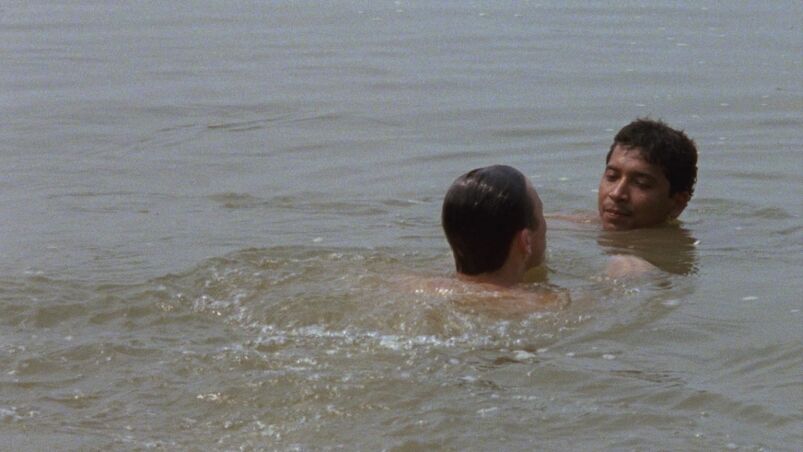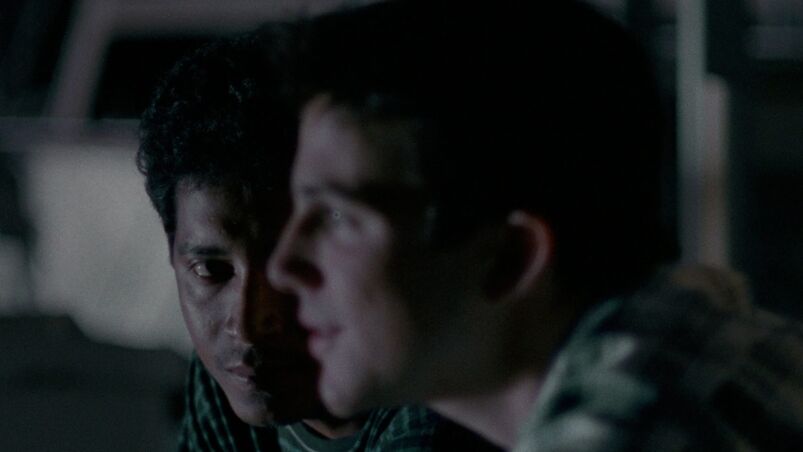
Welcome back to our queer film retrospective, “A Gay Old Time.” In this week’s column, we revisit 1996’s The Delta, the first full-length feature from prolific queer filmmaker Ira Sachs.
Last weekend, Passages, the newest film from acclaimed queer indie filmmaker Ira Sachs, opened in theaters. It stars Franz Rogowski as a film director engaging in a toxic love triangle with his husband (Ben Whishaw) and his young lover (Adèle Exarchopoulos). To commemorate its release—which has been buzzed for its NC-17 rating and explicit queer sex scenes—we’re looking back almost three decades to Sachs’ first feature film.
The Delta, Ira Sachs’ directorial debut, came out in the midst of the New Queer Cinema movement of the 1990s, a time where young, rebellious filmmakers like Gregg Araki, Derek Jarman, Todd Haynes, Gus Van Sant, and Cheryl Dunye made films that centered queer characters, themes, and issues in low-budget, independent narrative.
This movement sought to subvert and expand the traditional portrayals of sexuality in film, and the protagonists often chose to live on the margins of mainstream society or reject its ideals. The Delta falls neatly into this definition.
The Set-Up
[Ed. Note: The only trailer for The Delta currently available online is the above with German subtitles and title cards.]
The film revolves around two isolated and lonely young men in Memphis, Tennessee (Sachs’ hometown) as they meet, have a brief encounter, and eventually go their separate ways again—much like the landform that the movie is named after.
The first half follows Lincoln (Shayne Gray), an All-American, barely-legal young man who has led a straight life so far. He has a girlfriend, and a group of friends he regularly hangs out with. However, he never feels quite at ease or comfortable with them. He slowly starts seeking and exploring other spaces, and eventually starts acting on his queer impulses with strangers: going to parking lots to meet men, hanging in the shadows of shifty movie theaters, and cruising in arcades.
One of the men he meets is Minh (Thang Chang), a Vietnamese immigrant who is much more at ease with his sexuality, and seeks encounters with others often. Lincoln and Minh meet at a bar, and after a clear connection, Lincoln invites Minh to spend the day at his father’s riverboat. The two bond but eventually go their separate ways when Lincoln is unable to leave his girlfriend. He goes back to the straight life he had been leading, and Minh goes back to empty anonymous hookups.
Cruising In Memphis

The film is divided into three main segments. The first follows Lincoln exclusively before he and Minh meet. The middle portion follows their encounter. And the last half is about Minh returning to his old patterns, which are much more disturbing than we were originally led to believe.
What Ira Sachs does so effectively through this separation of the narrative is showing how Lincoln and Minh, both in their own ways, are each deeply longing for true connection, intimacy, and comfort with someone else. Unable to find it in their daily lives, the only time they’re truly able to let go and be at ease is with each other (a similar theme explored not too long ago in a past column here with My Beautiful Laundrette).
Related:
A young Daniel Day-Lewis starred in one of the most sensual and sensitive gay films of the ’80s
Daniel Day-Lewis spitting champagne into his lover’s mouth is an important part of queer cinema history!
Daddy-Son Roleplay

Lincoln is new to this queer sensations and desires, and is cautiously and nervously approaching them. Although he engages in sexual acts (he gets serviced in a car on a cruise-y lot, for example), he is clearly nervous and uncomfortable throughout.
In what is perhaps the best scene of the movie, an older man invites Lincoln over to his hotel room. The man asks him to strip, to flex his muscles, and to engage in daddy-son roleplay. Lincoln doesn’t know how to react—it’s clearly not the encounter he was expecting. Eventually, he gets too uncomfortable and leaves.
The older man, who more experienced though probably still very closeted, is never too aggressive. In their goodbye, there is a sense of a near-paternal pity that the man feels for Lincoln. He’s also looking to connect, but the only way he knows how is through anonymous, sexually-charged encounters. Which is exactly how Minh moves through the world…
An Unfortunate Twist

Minh left behind a wife in Vietnam. In America, he feels free to explore his true self, and recklessly engages in quick sex with many men, as we learn from his also-queer roommate after he returns from an escapade with Lincoln. Minh, unlike Lincoln, is able to freely be himself, doesn’t hide his sexuality, and openly gives in to his desires. But he’s looking to connect just as much as Lincoln is.
And here’s where the problematic twist comes in. In the last scene of the movie, Minh has gone home with another man, in what we assume is just one more in a series of hookups. However, just as they are cuddling, Minh strangles the man and kills him. We are led to believe that Minh is some sort of serial killer that murders men after sleeping with them. And the reason why his connection with Lincoln was real is because he made it out alive.
It’s an unexpected, tonally jarring, and somewhat anticlimactic ending to what is otherwise a quiet examination of queer longing, repression, and desire. It falls into the ongoing tropes of the time of queer sexual repression materializing as violence. The thematic underlining would be just as effective if the film cut to black just before that moment; it’s unfortunate.
Paving A Path Of Our Own

But, missteps and all, The Delta is a solid representation of the state of queer film at that particular point in time. Much like Lincoln and Minh, queer filmmakers were trying to find their way away from what life had been like for decades (repressed, inauthentic), and into something much bolder, audacious, and daring. Something that, especially if you compare Ira Sachs’ own growth as a storyteller, has slowly but surely been achieved since then.
Related:
Ben Whishaw shows his sexy side (and backside) in this intimate and honest Sundance favorite
Celebrated gay filmmaker Ira Sachs delivers once again with the queer drama ‘Passages.’
The Delta is currently available to stream via The Criterion Channel.





















correctio
I saw Passages yesterday and absolutely hated it. So did all the people I saw it with, 3 gay men. The script is terrible, the Franz Rogowski character is insufferable, and the 2-minute gay sex scene is unpleasant to watch. The Adèle Exarchopoulos character is just plain pathetic. Nothing redeeming about Passages!
abfab
Are you sure it was 3?
correctio
did I stutter
Doug
I saw it yesterday also and enjoyed it. The character of Franz was a sleazeball from the very start, I couldn’t understand the attraction. But I thought the performances were great and I was never bored by the plot or how it developed. The sex scene certainly wasn’t erotic but I definitely didn’t find it distasteful.
Kangol2
You fail to mention that in The Delta the man Minh strangles is Black. It’s a repulsive, unnecessary, racist ending but so typical.
correctio
the only penis shown in Passages was, notably, the penis of a Black man who is cast to be sexually intimidating to the Franz character
Kangol2
Correctio, not surprising at all. I won’t even go into Sachs’s Keep the Lights On, but it definitely underlines some of his issues that pop up in The Delta and it sounds like Passages too.
bachy
omg I loathed Keep the Lights On. Romanticizing tedious gay crack addicts.
dwick
yay serial killers-really? I’ll skip
barbrasings
Did you mean GAY serial killers?
bachy
Realizing I don’t need to watch multiple murders to be entertained, I chose to skip all the endless serial killer films on offer, starting back in the 90s. One of my best decisions.
dbmcvey
I would watch Ben Wishaw read the phone book. I’ll definitely see Passages.